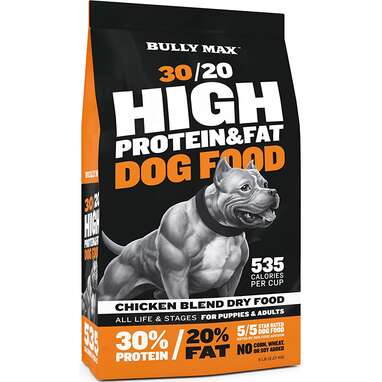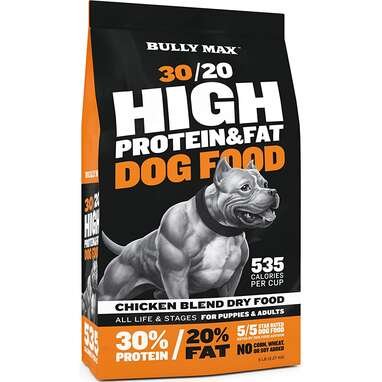Did you know that pitbulls were originally bred as working dogs for tasks like hunting, herding, and protecting livestock? Their strong and muscular build requires a specific diet to maintain optimal health and energy levels. So, what should you feed your pitbull to keep them happy and healthy?
When it comes to feeding your pitbull, it is important to provide them with high-quality, balanced dog food that meets their specific nutritional needs. Look for a dog food that is formulated for active breeds and is made from real meat as the main ingredient. Pitbulls also benefit from a diet that includes healthy fats, such as omega-3 fatty acids, to support their skin and coat health. Remember to portion control and avoid overfeeding, as pitbulls can be prone to weight gain, which can lead to various health issues. By choosing the right food and feeding regimen, you can ensure that your pitbull receives the nutrients they need to thrive.
Choosing the right food for your pitbull is essential for their health and well-being. Start by considering their age, size, and activity level. Look for a high-quality dog food that is specifically formulated for pitbulls. Opt for a balanced diet that includes lean proteins, vegetables, and carbohydrates. Avoid feeding your pitbull table scraps or foods that are toxic to dogs. Regularly consult with your veterinarian to ensure your pitbull’s nutritional needs are being met.

What Should I Feed My Pitbull? A Comprehensive Guide to Proper Nutrition for Your Canine Companion
Are you a proud pitbull owner wondering about the best diet for your furry friend? Nutrition plays a crucial role in the overall health and well-being of your pitbull. From providing them with the right balance of proteins, carbohydrates, and fats to ensuring they receive essential vitamins and minerals, choosing the right food for your pitbull is essential. In this comprehensive guide, we’ll dive deep into the world of pitbull nutrition, exploring the various factors to consider when deciding what to feed your pitbull. So, let’s get started and help you make informed decisions when it comes to your dog’s diet.
Understanding Your Pitbull’s Nutritional Needs
Pitbulls are active and athletic dogs, known for their muscular build and high energy levels. To support their active lifestyles, pitbulls require a balanced and nutritious diet. As responsible pet owners, it’s crucial to understand their unique nutritional needs and tailor their diet accordingly.
1. The Role of Proteins in Your Pitbull’s Diet
Proteins are the building blocks of your pitbull’s muscles, tissues, and organs. They play a vital role in supporting growth, repair, and overall health. A high-quality dog food for pitbulls should contain a substantial amount of animal-based proteins like chicken, beef, or fish. Avoid foods that list plant-based proteins, such as soy or corn, as the primary ingredient, as they are less biologically valuable for your pitbull’s nutritional needs.
Pitbull puppies require a higher protein intake than adult pitbulls to support their rapid growth and development. Look for puppy-specific formulas that provide a minimum of 30% protein content. Adult pitbulls should consume a diet with at least 20% protein content.
In addition to quantity, the quality of the protein source is crucial. Look for dog foods that specifically mention animal meal or meat as the main ingredient rather than vague references like “meat by-products” or “meat meal.”
2. The Right Balance of Carbohydrates for Energy
Carbohydrates are an important source of energy for your pitbull. However, it’s essential to strike the right balance. Avoid food with excessive amounts of carbohydrates, especially those that rely heavily on fillers like corn, wheat, or soy.
Oats, brown rice, sweet potatoes, and other complex carbohydrates should form the basis of your pitbull’s diet. These provide sustained energy release and are easier for your dog to digest. Look for dog foods that list these high-quality carbohydrates as primary ingredients to ensure a well-rounded diet for your pitbull.
It’s important to note that some pitbulls may have specific dietary needs. If your pitbull has a medical condition, such as diabetes or allergies, consult your veterinarian for tailored dietary recommendations.
Key Takeaways: What Should I Feed My Pitbull?
- A balanced and nutritious diet is essential for pitbulls to ensure their health and well-being.
- High-quality dog food that meets their unique nutritional needs should form the basis of their diet.
- Protein should be the main component of their diet, preferably from animal sources like meat and fish.
- Fruits, vegetables, and whole grains can be added to provide necessary vitamins, minerals, and fiber.
- Avoid feeding your pitbull with high-fat foods and excessive amounts of treats.
Frequently Asked Questions
Are you wondering about the best diet for your pitbull? Here are some of the most common questions related to what you should feed your beloved furry friend.
1. How do I choose the right dog food for my pitbull?
When selecting dog food for your pitbull, opt for high-quality brands that meet the nutritional requirements for the breed. Look for protein-rich options that contain a balance of lean meats, whole grains, and vegetables. Avoid foods with fillers, artificial additives, and excessive amounts of grains.
Consult with your veterinarian to ensure that the food you choose is appropriate for your pitbull’s specific needs, such as weight management or dietary restrictions. It’s essential to strike a balance between your dog’s nutritional requirements and any health concerns they may have.
2. Should I feed my pitbull wet or dry dog food?
Both wet and dry dog food can be suitable for your pitbull, but it’s important to evaluate your pup’s individual needs and preferences. Dry food tends to be more convenient and affordable, while wet food can provide additional hydration and a different texture that some dogs prefer. Some owners even choose to mix wet and dry food for a balanced diet.
Regardless of your choice, ensure that the food meets the nutritional requirements of your pitbull and consult with your veterinarian if you have any concerns or specific health considerations.
3. Can I feed my pitbull a homemade diet?
Feeding your pitbull a homemade diet can be done, but it requires careful attention to ensure they receive adequate nutrition. Consult with a veterinary nutritionist to develop a balanced recipe that includes the right proportions of proteins, carbohydrates, fats, and essential vitamins and minerals.
Remember that homemade diets can be time-consuming and may require more planning than commercial dog food. Regular consultations with the veterinarian are crucial to ensure your pitbull is receiving the necessary nutrients for optimal health.
4. How often should I feed my pitbull?
The frequency of feeding your pitbull depends on their age, activity level, and overall health. Generally, it’s recommended to feed adult pitbulls twice a day, dividing their daily portion into two meals. Puppies, on the other hand, may require three to four meals a day to support their growth and development.
It’s crucial to establish a consistent feeding schedule and avoid free-feeding to prevent obesity and maintain a healthy weight. Consult with your veterinarian to determine the appropriate amount of food and feeding frequency for your pitbull.
5. Can I give my pitbull table scraps or human food?
While it may be tempting to share your food with your pitbull, it’s generally best to avoid giving them table scraps or excessive human food. Many human foods can be toxic or harmful to dogs, such as chocolate, onions, grapes, and certain spices.
Stick to a balanced diet formulated specifically for dogs to ensure they receive the necessary nutrients without risking their health. If you want to offer your pitbull occasional treats, choose dog-safe options made specifically for them.

Raw Food vs Kibble: What should you feed your pit bull?
Summary
Feeding your pitbull a balanced and nutritious diet is important for their health. Start by consulting with a veterinarian to determine their specific dietary needs. Choose high-quality dog food that contains real meat and avoid fillers or artificial ingredients. It’s important to feed them the right amount and avoid overfeeding to prevent weight gain. Make sure they have access to clean water at all times and avoid feeding them human food or table scraps. Lastly, monitor their weight and body condition regularly to ensure they are staying healthy.
In addition to a good diet, regular exercise is crucial for a pitbull’s overall wellbeing. Provide daily exercise through activities like walks, runs, or interactive play. Mental stimulation is also important, so consider puzzle toys or training sessions. Keep an eye out for any changes in their eating habits or weight and consult a veterinarian if you have any concerns. With proper nutrition, exercise, and care, your pitbull can live a happy and healthy life.
